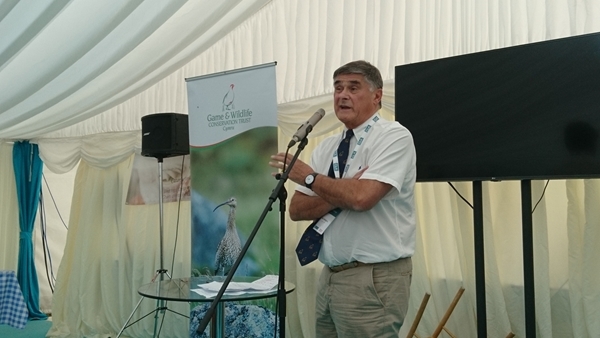
THE desperate need to halt alarming wildlife declines in the Welsh countryside was the theme at today’s Royal Welsh Show at the Game & Wildlife Conservation Trust (GWCT) Cymru briefing.
Several passionate speakers from the Trust stressed the urgency for action to save our threatened countryside and encouraged the need to champion ‘best practice’ to safeguard the industry. It launched its new publication, ‘The Knowledge’, which is to be followed up by an online self-assessment to help shoots demonstrate the adoption of the highest standards.
Dylan Roberts, head of fisheries for GWCT, spoke emotionally about the state of the rivers and the need for much more collaborative working with all stakeholders to address the problems.
He recalled in the 1980s and 1990s for Wales being the mecca for sea trout - sewin fishing - worth an estimated £14m every year and that the River Tywi supported an average rod catch of over 6,000 sewin a year, whereas in 2016, only 1,743 sewin were declared by Tywi anglers.
Salmon populations are also in a rapid rate of decline, with 21 out of 22 Welsh salmon rivers classed as ‘at risk’ and only 37% of Welsh rivers are achieving good ecological status.
“The deterioration in our rivers is in crisis and a new approach in pulling together with the wider community has to be the way forward,” said Dylan.
“Brexit gives us an opportunity to re-write the rule book and put the environment first. We have to work with all the farmers and all stakeholders affected to demonstrate what actions are needed on the ground and to find solutions before it is too late. We are all agreed that the Tywi for example is in an appalling state; we must restore it. We want new policies in place to reward our farmers to protect the environment and also to be viable.”
Duncan Sinclair is one of the gamekeepers on the Powys Moorland Partnership which is looking at boosting the number of ground-nesting birds by improving heather habitats through a Welsh Government/EU funded Sustainable Management Scheme.
He said: “Our landscapes should be viewed as national heritage property that needs managing and maintaining. If they are to recover the number of declining numbers of bird species, strengthen their capacity to hold water and lock in carbon, as well as being amazing places to visit. It’s a big ask and it needs huge investment to deliver this brief effectively.”
“Gamekeepers work hundreds of hours a week for a modest pay because they care passionately about the wildlife and what is supports, but they can’t do it alone.”
Wildlife artist Owen Williams, founder of Woodcock Network, spoke about the impressive level of woodland habitat creation and maintenance work conducted by shoots. He cited the award-winning 30 hectares of woodland and 19 ponds created near Tregaron by The Camddwr Shooting Society that have brought significant gains in biodiversity to the area.
GWCT Cymru chairman Nick Williams, pictured above, concluded the reception saying “we need to celebrate our Welsh countryside by doing what we know needs to be done. We really are running out of time and we have the evidence but we need action now”.
Notes to editors
The Game & Wildlife Conservation Trust – providing research-led conservation for a thriving countryside. The GWCT is an independent wildlife conservation charity which has carried out scientific research into Britain’s game and wildlife since the 1930s. We advise farmers and landowners on improving wildlife habitats. We employ more than 60 post-doctoral scientists and other research staff with expertise in areas such as birds, insects, mammals, farming, fish and statistics. We undertake our own research as well as projects funded by contract and grant-aid from government and private bodies.
For information, contact:
Eleanor Williams
Telephone: 07592 025476
Email: press@gwct.org.uk